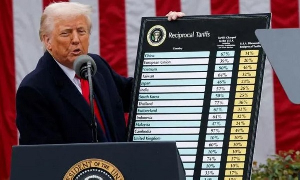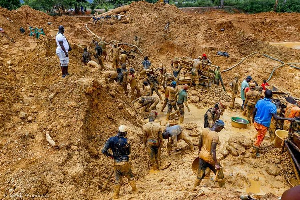Ghana is on course to establishing fire stations in every district of the country. The Volta Region is close to having 80% coverage in that direction and we are pleased to learn that even in the face of budgetary constraints, fire tenders continue to be acquired for this important service.
We have been constrained to discuss the subject of fire fighting and prevention against the backdrop of the call by the Chief Fire Office, Brown Gaisie, on Ghanaians to change a new leaf in their attitude towards fire.
Fire attitude is one area most Ghanaians are found lacking. From policymakers to the man in the alley of the neighbourhood, we all must change our attitudes towards fire.
Town and country planners must take into consideration the importance of access to fire tenders so that in case of fire the firefighting equipment would not be hindered in any way from performing their roles.
There have been many instances where fire tenders failed to discharge their functions on time, leading to avoidable destruction and sometimes loss of lives because of such hindrance.
Sometimes even when such accesses are included in the town and country plans, they are ignored with impunity because those in-charge of ensuring that they are protected fail to live up to expectation. Very soon, therefore, these places are littered with all manner of structures.
We as a people never consider such little but very important things because we think that there will never be fires near us. It is only when such mishaps occur that we remember the Ghana National Fire Service (GNFS) and perhaps the admonitions personnel give us.
Our roads are constructed in such a way that in most cases fire tenders and ambulances are unable to meander their way through the traffic jams – the feature of urban roads in our part of the world.
Even when fire tenders have their sirens blaring, only a few vehicles show the urgency required to facilitate passage for the tenders.
Now that our streets are being named, we think that the challenge of locating fire scenes through pedantic directions would soon be a thing of the past. It is only a hope because there does not seem to be any conscious efforts on the part of the people to learn the names of their streets and to apply them.
Periodic display of telephone numbers of fire stations near us in the newspapers would be helpful. Currently, most people would depend on the police to contact the nearest fire stations in case of emergency, which is awful.
The issue of fire hydrants at vantage points in our cities, especially Accra, has not been solved and so when there is a major fire outbreak, fire tenders are compelled to cover precious extra distances to draw water.
Sometimes people call the fire services only for such calls to turn out to be hoaxes.
We take things for granted to the extent that people in some neighbourhoods, for lack of where to drop their domestic garbage, set fires by the street-side regardless of how combustible the materials they burn are.
Dr Brown Gaisie’s call for change in our attitude towards fire even as he continues to sue for the establishment of more fire stations across the country should be digested seriously.
Opinions of Sunday, 25 October 2015
Columnist: Daily Guide














